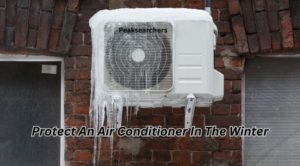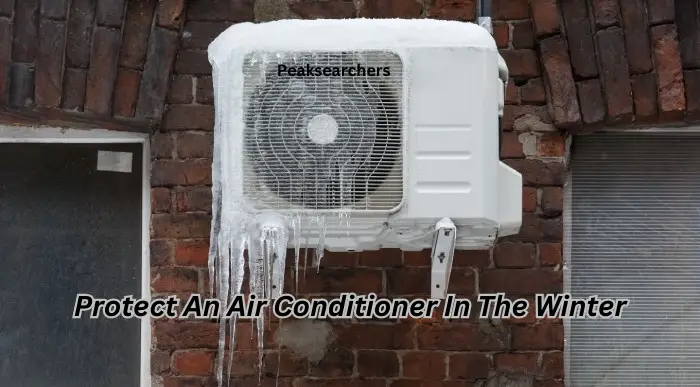How Do You Protect An Air Conditioner In The Winter? A Step By Step Guide
Winter is a time of year when people typically don’t think about their air conditioner units. However, it’s important to protect these systems during the colder months to ensure they’re in good condition come springtime. Below are some steps you can take to winterize your air conditioning unit.
I also have an experience of protecting my air conditioner in the winter. Once I did not do so, and my AC had many issues.

Why protecting your air conditioner in winter is important
1. Cover the Outdoor Unit: Your air conditioner’s outdoor unit is designed to withstand harsh weather conditions, but that doesn’t mean it won’t suffer from wear and tear over time. To protect it during winter months, cover the unit with a waterproof cover or tarp.
2. Clean the Unit: Before covering your AC, make sure it’s clean by removing debris like leaves, twigs, and dirt from around the unit. This will help prevent moisture buildup and potential damage to internal components.
3. Turn off Power: Switch off power to your AC at the main breaker before covering it up for winter. This will prevent any accidental start-up that could cause damage or injury.
Protecting your air conditioner during winter is important because extremely cold temperatures can cause damage to sensitive components inside your AC unit. By taking these simple steps to protect your AC in the winter months, you can extend its lifespan and reduce the need for costly repairs down the line.
Additionally, protecting your air conditioner helps ensure optimal performance when you need it most during hot summer months when temperatures soar high and require cooling systems that are well-maintained and ready to run efficiently as possible.
Step 1: Turn off the power to the unit.
The first step in protecting your air conditioner during winter is to turn off the power supply to the unit. This can be done by switching off the breaker that controls it or unplugging it from its power source.
By doing this, you not only prevent any accidental activation of the unit but also protect it from electrical damage due to storms and power surges.
It’s crucial to ensure that there’s no residual electricity flowing through the system before proceeding with further protective steps.
It’s advisable to double-check by using a voltage tester before commencing work around the AC unit. Turning off your AC’s power supply will also save you on energy bills since your unit won’t be running while temperatures drop low.
Step 2: Clean the unit and remove debris.
Cleaning your air conditioning unit is an important step in winterizing it. This helps to prevent dirt, leaves, and other debris from clogging up the system during the off-season. To clean your AC unit, first, turn off the power supply by unplugging it from the wall or turning off the circuit breaker that supplies electricity to it. Then, use a soft-bristled brush or vacuum cleaner to remove any dirt or debris from around the unit’s coils and fins.
Next, remove any leaves or other large debris that may have accumulated on top of or around your AC unit using a leaf blower or broom. Be sure to check inside of your air conditioner for any smaller items like twigs and grass clippings that may have found their way inside.
If you notice a buildup of dirt or grime on your AC unit’s exterior surface, use a mild detergent solution and water to clean it off gently. Avoid using harsh chemicals as they can damage sensitive components within your air conditioning system.
By regularly cleaning your AC unit before winter sets in, you’ll be able to keep it working efficiently throughout its lifespan while also preventing costly repairs down the line.
Step 3: Cover the unit with a waterproof cover
Step 3 in protecting your air conditioner during the winter months is to cover it with a waterproof cover. This step is crucial as it helps prevent water and debris such as leaves, ice, or snow from getting inside the unit, which could cause damage to the internal parts. When selecting a cover, ensure that it fits snugly over the unit and is made of breathable material to prevent moisture buildup.
A waterproof cover also protects against rust and corrosion caused by exposure to moisture. In regions with harsh winters where snowfall can be heavy, a well-designed air conditioner cover can help protect your unit from damage caused by heavy loads of snow piling up on top of it. Before covering your air conditioner, make sure that all hoses and pipes are well-insulated to prevent freezing.
In conclusion, covering your air conditioning unit during winter play an essential role in ensuring its longevity and preventing costly repairs or replacement down the line.
A good quality waterproof cover will not only keep your AC clean but also protected it from external elements like wind, rain, snow, or ice that can cause mechanical problems later on if left unchecked.
Step 4: Elevate the unit to prevent water damage
Step 4 of protecting your air conditioner in the winter is to elevate the unit to prevent water damage. This is especially important if you live in an area with heavy snow or rainfall. When there’s too much moisture around the AC, it can cause rust and corrosion on its components.
To do this step, you can use concrete blocks or a specialized stand designed for this purpose. The goal is to raise the unit off the ground and provide enough clearance for any water or snow that may accumulate around it during winter.
Remember to also clear any debris or leaves that are sitting on top of the unit before elevating it. This will prevent them from getting trapped under the elevated AC and potentially causing damage over time.
Overall, taking care of your air conditioner during winter will ensure its longevity and optimal performance when you need it again in warmer months.
Step 5: Regularly check on the unit throughout the winter
Once you have prepared your air conditioner for winter, it’s important to regularly check on the unit throughout the season. This means scheduling periodic inspections or doing routine checks yourself to ensure that everything is in working order.
One of the most important things to monitor is any accumulation of ice or snow on the unit. Heavy snow and ice can cause damage to the AC compressor and coils, which can lead to costly repairs down the line. Removing any buildup with a broom or gentle brush can help prevent this.
Another key aspect of monitoring your unit during winter is making sure that it remains covered and protected from debris. High winds can blow debris onto an uncovered AC unit, potentially damaging it or clogging up its internal components. Investing in a protective cover or tarp can help keep your air conditioner safe from these elements.
By taking these steps to check on your air conditioner throughout winter, you’ll be able to rest easy knowing that it’s properly protected and ready for use when warmer temperatures return.
FAQ’s
1. Do I need to cover my air conditioner in the winter?
Yes, it’s important to protect your air conditioner during the winter months to prevent damage from snow, ice, and other harsh weather conditions. Covering your air conditioner also helps keep debris and leaves out of the unit.
2. What kind of cover should I use for my air conditioner?
It’s important to choose a breathable cover made specifically for air conditioners. Avoid using a plastic or vinyl tarp as it can trap moisture and cause corrosion.
3. Should I turn off the power to my air conditioner in the winter?
Yes, turn off the power to your AC unit before covering it. This will help prevent any accidental damage that may occur if someone turns on the unit while it is covered.
4. Do I need to clean my air conditioner before covering it?
Yes, make sure your AC unit is clean and free of debris before covering it for the winter season.
5. How often should I check on my covered air conditioner during winter?
Check on your covered AC unit periodically throughout the winter season to make sure no water has accumulated inside or around the unit.
6. Can I remove the cover during mild weather in winter?
If there are a few days of mild weather in between colder temperatures, you can remove the cover from your AC unit temporarily.
Also read: How To Quiet A Noisy Air Conditioner In Easy Steps? A Step By Step Guide
Conclusion
In conclusion, protecting your air conditioner during the winter season is essential to ensure its longevity. One of the most important steps you can take is to clean or replace the air filters before storing them for the winter. This will prevent debris from accumulating in your system and help improve its overall efficiency.
Another crucial step to protect your air conditioner is to cover it with a weatherproof cover. This will not only keep snow and ice from building up on your unit but also protect it from potential damage caused by strong winds or other harsh elements during inclement weather conditions.
Lastly, it’s imperative that you disconnect all power sources before storing your air conditioning unit for any extended period. It’s best to unplug all electrical components such as thermostats, fans, and other accessories as well so that they don’t draw unnecessary power when not in use which can cause damage over time. By taking these simple steps, you can ensure that your air conditioner stays safe and functional throughout the winter months and beyond.


